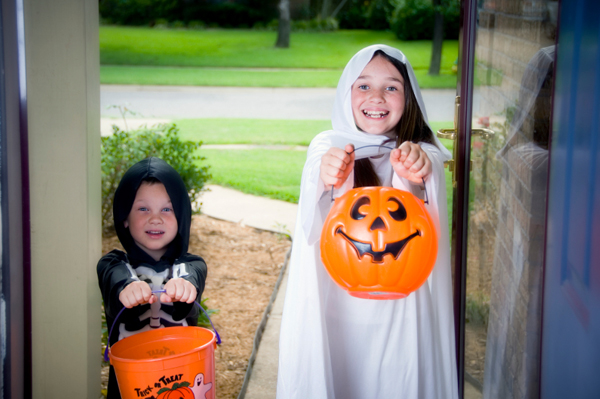Halloween is one of the oldest festival in the world. It is celebrated more than any holidays because it's fun, good, and harmless for everyone. But not everyone knows the meaning of Jack O' Lantern that they carved, the tradition of Trick or Treat and the crazy old witch costumes. As we know, Halloween was a Celtic New Year during the final harvest of the year and the Celtics had a strong faith in magical properties during the transition between summer and winter season. All crops were harvested, prepared the offerings and the sacrifice, and appeased the gods with singing, dancing and parades.
Pumpkin
| "Bright in the dark, tear down the past with a brim of light" credits: digsdigs.com |
Pumpkin is famous on Halloween, which looks like a cauldron. Back to the old days at British Isle, the hollowed-turnips with embers or candles were used to ward off Stingy Jack* and malevolent spirits on Halloween. Some of them believe that the bright lights from the hollowed-turnips will help the dead family members to come home during Halloween for dinner and also lead them to return to their resting place when before the sunrise. This tradition is also representing the existing of souls and the dead, the symbol of resurrection and faith to the other world. Around 1840, during a massive immigration of Irish families who emigrated to America, they were decided to replace turnips with pumpkins because they lived in the new land, pumpkins were plentiful and very easy to carve. And that's how pumpkin becomes the cultural image of Halloween.
*the famous cheapskate who try to avoid losing his soul to the devil by tricking him during All Hallow's Eve every year. But in the end, he was cursed to travel forever as a spirit in limbo. In every Halloween, Jack will return to earth with his hollowed-turnip lantern, walking out through the darkness.
Treats
 |
| "Trick or treat, give us something good to eat" credits: sheknows.com |
On Halloween, American families spent a lot for candies in Trick or Treat tradition. During the age of Celtic, they had a strong believe in spirits- a good spirit, an evil spirit and a mischievous spirit, also known as fairies. Fairies had the abilities to disguise as an old man, or a beggar and those who gave them food were rewarded. If they didn't receive food, the family will receive some unpleasant things from them. There were also a tradition during All Soul's Day when the 'soul cakes' were baked for the unfortunate children. They will walk from door to door, begging for the cakes. For those who gave the cakes, they will receive good prayers from the children and these prayers would help them out from the purgatory and into heaven.
After America revolution, this tradition had changed when the food sources were easy to get and creating new sweet recipes from honey bee, taffy pulls or apple caramels. But it becomes a vandalism issue of Trick or Treat in 1950s and later it becomes more of a child's celebration. Treats were handed out to them as a gift, a happy thing to receive from neighbours and to prevent bad tricks from them. As you know, kids are unpredictable.
Costumes
| "Hi, I'm a lobster" credits: treehousetv.com |
Halloween is all about costumes. This tradition can be traced back during the old times when All Saints Day was moved to 1 November, adapted by the church in order to help bring the ancient Celts into Christianity. But it created problems for the church when the Samhain tradition is more than Christianity. So villager were allowed to dress like a saint, walk from door to door and ward off the evil spirits. Some of them dress like a spirit so spirits won't recognized them and they'll be safe from any disturbance.
The other reason for costumes was to appease the gods of the coming winter. The new year festival lasts for 3 days, with many parades and costumes made of skins and heads of the animal, representing the various gods of the nature.
One of the typical costume is the witch, usually a woman in magic, wearing a long hat and flying with her broomstick. The legend says that, on one night in All Hallow's Eve, one priest saw the burning bonfires. With the grim light of full moon, he thought that those people who dance with shafts and torches around the bonfires were flying on air. That priest hurriedly return to the village and told everyone that he saw witches were flying, and that was how the flying broomstick comes from.
Today, Halloween is not about deadly offerings, sacrifices, gods of nature or supernatural things. It is all about wonderful childhood memories, happy tooth problems, carving-creativity, fashion parades and also, the next day of 'walk-of-shame'.
Well, Happy Halloween~
@themagi2013
You can read more at:
No comments:
Post a Comment